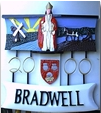Some years ago, Bradwell Parish Council appointed its caretaker, Mr Chris Wright, to the role of Community Dog Warden, within its Green Lane Playing Field and Gipsies Green sites, and elsewhere in Bradwell. Mr Wright has recently resigned from his post, and Mr Kevin Nursey, his successor, has taken on the role .
The aim of the Community Dog Warden is to influence local residents to have a responsible attitude towards dog ownership. Dog owners have a general duty to keep their pets under control and not cause nuisance towards others in public areas. Obviously, dogs do require exercise; however, this should be done in a manner appropriate to the circumstances and controlled in a manner to prevent accidents, nuisance or injury. The responsibility of dog owners to clear after their pet has fouled is essential for both health and public amenity reasons.
The Community Dog Warden helps in being a visual deterrent and a focal point for the public should they have any concerns. Being local and part of a local body it may also be the case that the public feel more comfortable in sharing any information they have about offenders. Mr Wright will wear a high visibility garment and have a relevant identity badge, with passport sized facial photo.
The Issue of Dog Fouling
Over the years there has been a social change, making the issue of dog fouling more and more unacceptable. Today dog fouling is one of the main complaints that the Gt Yarmouth Borough Council Environmental Health Department receives, and in recent years Safer Neighbourhoods Teams of the Police have found that the issue is highlighted by the public as a priority they want tackling. It has been found that the problem does show a marked increase in the winter months where the cover of darkness and fewer people about provides more opportunity for people to ignore their responsibilities.
Unfortunately, whilst the public does find the issue unacceptable, it has been found that generally information about offenders is not forthcoming, meaning that, in most cases, officers are very much trying to tackle the issue on their own. Also, with limited resources, being in the right place at the right time for an act that takes twenty seconds to occur is very difficult. The Community Dog Warden proactively helps address this by their presence in areas where dog fouling has become a problem.
Why Dog Fouling?
Legislation was brought in to tackle the issue of dog fouling due to the health issues it can cause. Toxocariasis canis is a worm that dog faeces can carry. Eggs from the worm can lay dormant in soil indefinitely and where ingested can hatch into larvae in the human stomach. The larvae migrate to other parts of the body and can, in the worst case scenario, cause blindness or breathing problems. Children are most at risk.
Extreme cases of Toxocariasis are, fortunately, not common; however ingestion of faeces has the potential, at the very least, of causing sickness. Additionally no doubt, we have all had the unenviable task of cleaning dog foul off shoes or bike or pram wheels.
Legislation
Great Yarmouth is covered by the Dogs (Fouling of Land) Act 1996, which makes it an offence not to clear up forthwith after a dog has fouled on most public land and private land to which the public has access. There are a number of land types which are exempt – highways with a speed limit of more than 40mph; heathland; agricultural land; and forestry land.
The legislation does not apply to areas which the public would not have access to, such as private gardens etc. Persons registered as being blind are also exempt from having to pick up.
An offence has been committed irrelevant to whether the person responsible for the dog knew that the dog had fouled or not, and it is not an excuse to say that they had no receptacle to pick it up with.
Offenders can be given fixed penalty notices, which are currently at £80, but because of public feeling, the nature of the issue and because of the limited information received about offenders, prosecution action is sought in all cases where adequate evidence is available and it is in the public interest to do so. The maximum fine that the court can impose is £1,000.
Other Dog Issues
- There are number of Dog Bans in place around the Borough. In the Bradwell area bans are in force in children’s fenced public playgrounds.
- Stray dogs, where detained, are collected by the Borough Council’s contractor. To report a detained stray dog please call 846478 or 330369 outside office hours.
- Both the Borough Council and the Police have a responsibility over dangerous dogs; however, where there is a direct threat to public safety we recommend using 999.
- Dogs on leads. Generally speaking, unless the dog is being walked on an area which is signposted as dogs being required to be on a lead, the law only requires a dog to be under control, which does not necessarily mean being leashed.
- Accumulation of faeces on private land. This may be treated as a nuisance and should be reported to Environmental Health on 846478.
- Noisy/barking dogs on a property and causing a nuisance can be reported to Environmental Health on 845478.
